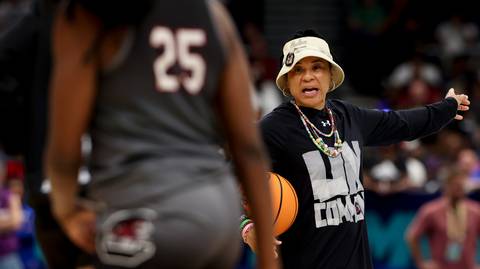In the aftermath of another historic season for the South Carolina Gamecocks, head coach Dawn Staley took a moment to speak not only about her team’s on-court success, but also the off-court narratives that continue to surround the program — and women’s college basketball as a whole. With her usual blend of grace, honesty, and conviction, Staley called out the national media for what she believes is an imbalance in how teams — particularly her own — are covered and perceived.
Coming off an undefeated national championship season and establishing South Carolina as a modern dynasty in the sport, Staley has earned the right to speak with authority. But instead of simply basking in the glow of another trophy, she used her platform to address something deeper — the disparity in how narratives are created and perpetuated around teams like hers, often to the detriment of progress in women’s sports.
“We Deserve the Same Respect”
Speaking to reporters in a recent press conference, Staley didn’t hold back.
“We’ve done everything people said we couldn’t do,” she said. “We’ve won championships. We’ve sent players to the WNBA. We’ve built a program that wins the right way. And yet, the way our program is talked about, it’s not always with the same respect that other programs get. Why is that?”
The Gamecocks’ head coach pointed to discrepancies in national media coverage — both in tone and volume — as evidence that South Carolina is often viewed through a different lens than some of the sport’s legacy programs. While traditional powerhouses like UConn and Stanford continue to receive widespread praise and attention regardless of results, Staley noted that her team still often finds itself fighting for validation despite consistent excellence.
“It’s not about jealousy. It’s not about bitterness. It’s about fairness,” Staley emphasized. “If we’re being honest, the coverage of women’s basketball still has a bias — and sometimes that bias works against programs that look like mine.”
Changing the Narrative
Staley’s comments reflect a broader concern within women’s sports: the gatekeeping power of national media. Whether it’s highlighting certain players more than others, creating drama around coaching styles, or focusing on perceived “attitudes” rather than results, narratives shape public perception in powerful ways.
Despite going undefeated and capturing the program’s third national title under her watch, Staley noticed that much of the national conversation centered elsewhere — including the star power of opposing players, personality clashes, and debates about “the right way to win.” In short, South Carolina, she believes, was too often left out of the spotlight they had rightfully earned.
“Our players hear it. Our fans hear it. And I hear it,” Staley said. “We don’t ask for special treatment. We ask for equal treatment.”
The Gamecocks have not only built a winning culture — they’ve changed the landscape of the sport. Their games routinely break attendance records. Their players dominate award watch lists. And Staley herself has become one of the most recognizable and respected coaches in basketball. Yet, as she points out, it still feels like South Carolina has to do more just to be seen in the same light.
A Legacy Bigger Than Basketball
Staley also touched on what her team represents beyond the court. With a predominantly Black roster and coaching staff, the Gamecocks’ success sends an empowering message to young athletes and future leaders. But Staley acknowledged that this can sometimes come with added scrutiny — or at least different standards.
“We celebrate who we are. We’re proud of our identity. We’re proud of what we’ve built. But I want to live in a world where we don’t have to be twice as good just to get half the recognition,” she said.
Her message resonated deeply with players, alumni, and fans alike — many of whom took to social media to echo her sentiments and call for more balanced, unbiased media coverage.
Looking Forward
While Staley continues to stack wins and hang banners, her focus remains on long-term change. She wants the next generation of players — whether at South Carolina or elsewhere — to enter a world where equal success means equal recognition, where the game is appreciated for its skill and storylines without distortion.
“This game is beautiful. It’s growing. It’s powerful. And it deserves to be told in full,” Staley concluded.
As the 2024–25 season fades into the rearview and the accolades continue to pour in, one thing is clear: Dawn Staley isn’t just coaching a basketball team. She’s leading a movement. And her voice, as fierce and fearless as ever, is a necessary one in the ongoing conversation about equity, respect, and the future of women’s sports.

 and no Matter the outcome we stick to be very committed fans never minding……readmore..
and no Matter the outcome we stick to be very committed fans never minding……readmore..